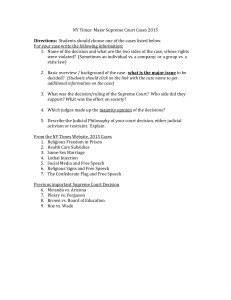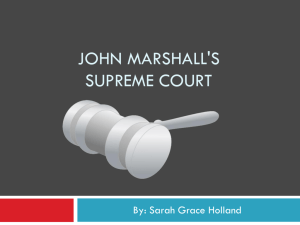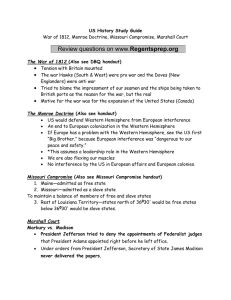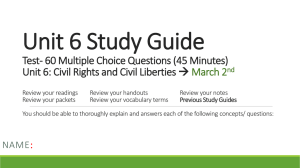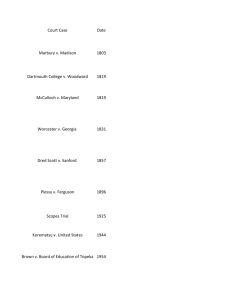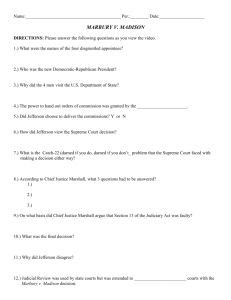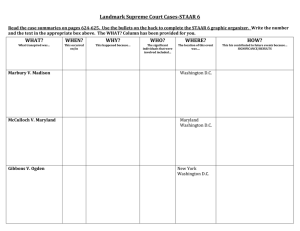Plessy v. Ferguson
advertisement
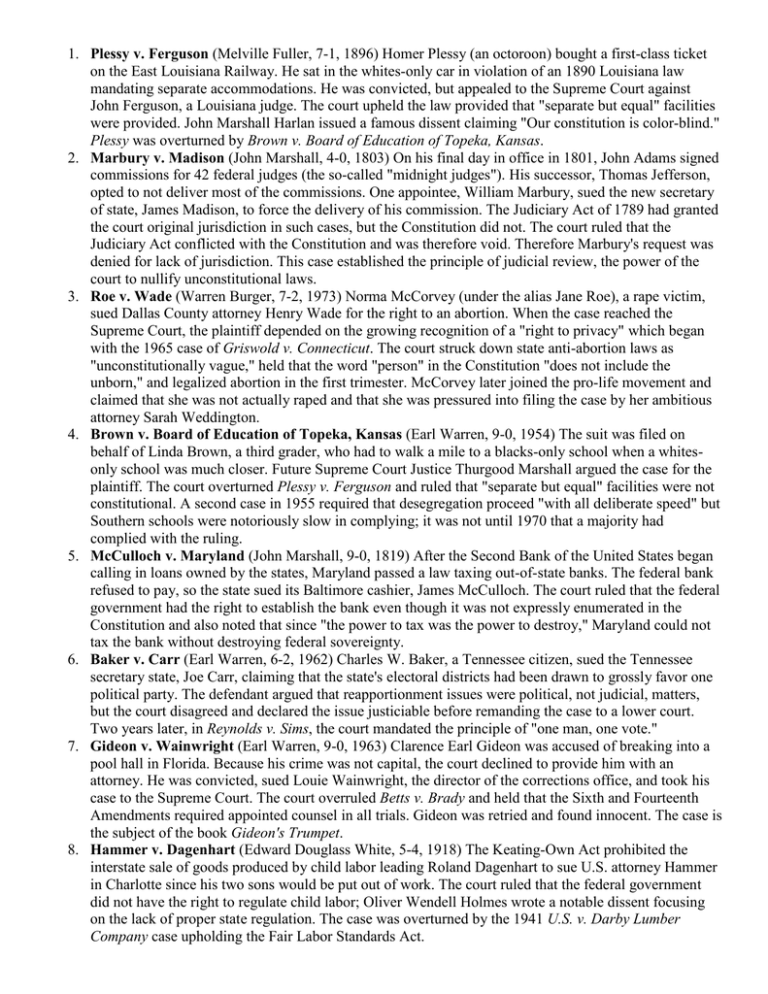
1. Plessy v. Ferguson (Melville Fuller, 7-1, 1896) Homer Plessy (an octoroon) bought a first-class ticket on the East Louisiana Railway. He sat in the whites-only car in violation of an 1890 Louisiana law mandating separate accommodations. He was convicted, but appealed to the Supreme Court against John Ferguson, a Louisiana judge. The court upheld the law provided that "separate but equal" facilities were provided. John Marshall Harlan issued a famous dissent claiming "Our constitution is color-blind." Plessy was overturned by Brown v. Board of Education of Topeka, Kansas. 2. Marbury v. Madison (John Marshall, 4-0, 1803) On his final day in office in 1801, John Adams signed commissions for 42 federal judges (the so-called "midnight judges"). His successor, Thomas Jefferson, opted to not deliver most of the commissions. One appointee, William Marbury, sued the new secretary of state, James Madison, to force the delivery of his commission. The Judiciary Act of 1789 had granted the court original jurisdiction in such cases, but the Constitution did not. The court ruled that the Judiciary Act conflicted with the Constitution and was therefore void. Therefore Marbury's request was denied for lack of jurisdiction. This case established the principle of judicial review, the power of the court to nullify unconstitutional laws. 3. Roe v. Wade (Warren Burger, 7-2, 1973) Norma McCorvey (under the alias Jane Roe), a rape victim, sued Dallas County attorney Henry Wade for the right to an abortion. When the case reached the Supreme Court, the plaintiff depended on the growing recognition of a "right to privacy" which began with the 1965 case of Griswold v. Connecticut. The court struck down state anti-abortion laws as "unconstitutionally vague," held that the word "person" in the Constitution "does not include the unborn," and legalized abortion in the first trimester. McCorvey later joined the pro-life movement and claimed that she was not actually raped and that she was pressured into filing the case by her ambitious attorney Sarah Weddington. 4. Brown v. Board of Education of Topeka, Kansas (Earl Warren, 9-0, 1954) The suit was filed on behalf of Linda Brown, a third grader, who had to walk a mile to a blacks-only school when a whitesonly school was much closer. Future Supreme Court Justice Thurgood Marshall argued the case for the plaintiff. The court overturned Plessy v. Ferguson and ruled that "separate but equal" facilities were not constitutional. A second case in 1955 required that desegregation proceed "with all deliberate speed" but Southern schools were notoriously slow in complying; it was not until 1970 that a majority had complied with the ruling. 5. McCulloch v. Maryland (John Marshall, 9-0, 1819) After the Second Bank of the United States began calling in loans owned by the states, Maryland passed a law taxing out-of-state banks. The federal bank refused to pay, so the state sued its Baltimore cashier, James McCulloch. The court ruled that the federal government had the right to establish the bank even though it was not expressly enumerated in the Constitution and also noted that since "the power to tax was the power to destroy," Maryland could not tax the bank without destroying federal sovereignty. 6. Baker v. Carr (Earl Warren, 6-2, 1962) Charles W. Baker, a Tennessee citizen, sued the Tennessee secretary state, Joe Carr, claiming that the state's electoral districts had been drawn to grossly favor one political party. The defendant argued that reapportionment issues were political, not judicial, matters, but the court disagreed and declared the issue justiciable before remanding the case to a lower court. Two years later, in Reynolds v. Sims, the court mandated the principle of "one man, one vote." 7. Gideon v. Wainwright (Earl Warren, 9-0, 1963) Clarence Earl Gideon was accused of breaking into a pool hall in Florida. Because his crime was not capital, the court declined to provide him with an attorney. He was convicted, sued Louie Wainwright, the director of the corrections office, and took his case to the Supreme Court. The court overruled Betts v. Brady and held that the Sixth and Fourteenth Amendments required appointed counsel in all trials. Gideon was retried and found innocent. The case is the subject of the book Gideon's Trumpet. 8. Hammer v. Dagenhart (Edward Douglass White, 5-4, 1918) The Keating-Own Act prohibited the interstate sale of goods produced by child labor leading Roland Dagenhart to sue U.S. attorney Hammer in Charlotte since his two sons would be put out of work. The court ruled that the federal government did not have the right to regulate child labor; Oliver Wendell Holmes wrote a notable dissent focusing on the lack of proper state regulation. The case was overturned by the 1941 U.S. v. Darby Lumber Company case upholding the Fair Labor Standards Act. 9. Fletcher v. Peck (John Marshall, 6-0, 1810) In 1795 the Georgia legislature corruptly sold land along the Yazoo River (now in Mississippi) to private citizens in exchange for bribes. The legislators were mostly defeated in the next elections and the incoming politicians voided the sales. In the meantime, John Peck sold some of the land in question to Robert Fletcher, who then sued him, claiming that he did not have clear title. The Supreme Court held that the state legislature did not have the power to repeal the sale. This was one of the earliest cases in which the Supreme Court struck down a state law. 10. Ex Parte Merryman (Roger Taney, 1861) This was not actually a Supreme Court case, but a federal court case heard by Chief Justice Roger Taney while "circuit-riding" when the court was not in session. Lieutenant John Merryman of the Maryland cavalry took an active role in evicting Union soldiers from Maryland following the attack on Fort Sumter. Abraham Lincoln declared a secret suspension of the writ of habeas corpus and had a number of opposition leaders, including Merryman, arrested. Taney found the president had acted unconstitutionally (only Congress can suspend the writ), but Lincoln simply ignored his ruling.
